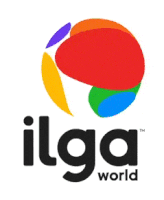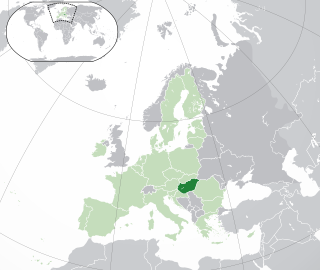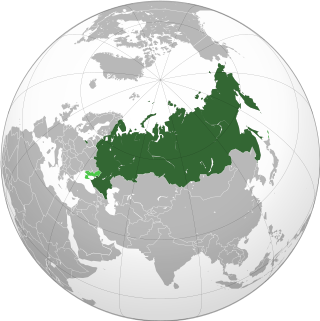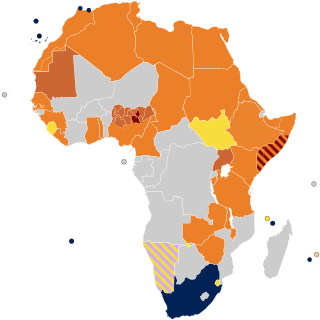Related Research Articles

The International Lesbian, Gay, Bisexual, Trans and Intersex Association (ILGA) is a LGBTQ+ rights organization.

Kyrgyzstan, officially the Kyrgyz Republic, is a landlocked country in eastern Central Asia, lying in the Tian Shan and Pamir mountain ranges. Bishkek is the capital and largest city. Kyrgyzstan is bordered by Kazakhstan to the north, Uzbekistan to the west, Tajikistan to the south, and China to the east and southeast. Ethnic Kyrgyz make up the majority of the country's over 7 million people, followed by significant minorities of Uzbeks and Russians.

Lesbian, gay, bisexual, and transgender (LGBTQ) people in Hungary face legal and social challenges not experienced by non-LGBT residents. Homosexuality is legal in Hungary for both men and women. Discrimination on the basis of sexual orientation and sex is banned in the country. However, households headed by same-sex couples are not eligible for all of the same legal rights available to heterosexual married couples. Registered partnership for same-sex couples was legalised in 2009, but same-sex marriage remains banned. The Hungarian government has passed legislation that restricts the civil rights of LGBT Hungarians – such as ending legal recognition of transgender Hungarians and banning LGBT content and displays for minors. This trend continues under the Fidesz government of Viktor Orbán. In June 2021, Hungary passed an anti-LGBT law on banning "homosexual and transexual propaganda" effective since 1 July. The law has been condemned by seventeen member states of the European Union. In July 2020, the European Commission started legal action against Hungary and Poland for violations of fundamental rights of LGBTQI people, stating: "Europe will never allow parts of our society to be stigmatized."

Human rights in Kyrgyzstan improved after the ouster of President Askar Akayev in the 2005 Tulip Revolution and the installment of a more democratic government under Roza Otunbayeva. While the country is performing well compared to other states in Central Asia, many human rights violations still take place. While LGBT rights have been declining in recent years, freedom of press has been improving.

Lesbian, gay, bisexual, and transgender (LGBT) people in Russia face severe challenges not experienced by non-LGBT residents. Although sexual activity between consenting adults of the same sex is legal, homosexuality is disapproved of by most of the population and pro-LGBT advocacy groups are deemed "extremist" and banned. It is illegal for individuals to "promote homosexuality" and same-sex couples and households headed by same-sex couples are ineligible for the legal protections available to opposite-sex couples. Russia provides no anti-discrimination protections for LGBT people and does not have a designation for hate crimes based on sexual orientation and gender identity. Transgender people are not allowed to change their legal gender and all gender-affirming care is banned. There are currently no laws prohibiting discrimination based on gender identity or expression, and recent laws could be used to discriminate against transgender residents.

Lesbian, gay, bisexual, and transgender (LGBT) people in Albania face legal challenges not experienced by non-LGBT residents, although LGBT people are protected under comprehensive anti-discrimination legislation. Both male and female same-gender sexual activities have been legal in Albania since 1995, but households headed by same-sex couples are not eligible for the same legal protections available to opposite-gender couples, with same-sex unions not being recognized in the country in any form.

Lesbian, gay, bisexual, and transgender (LGBT) people in Armenia face legal and social challenges not experienced by non-LGBT residents, due in part to the lack of laws prohibiting discrimination on the grounds of sexual orientation and gender identity and in part to prevailing negative attitudes about LGBT persons throughout society.

Lesbian, gay, bisexual, and transgender (LGBT) people in Moldova face legal and social challenges and discrimination not experienced by non-LGBTQ residents. Households headed by same-sex couples are not eligible for the same rights and benefits as households headed by opposite-sex couples. Same-sex unions are not recognized in the country, so consequently same-sex couples have little to no legal protection. Nevertheless, Moldova bans discrimination based on sexual orientation in the workplace, and same-sex sexual activity has been legal since 1995.
Homophobic propaganda is propaganda based on homonegativity and homophobia towards homosexual and sometimes other non-heterosexual people. Such propaganda supports anti-gay prejudices and stereotypes, and promotes social stigmatization or discrimination. The term homophobic propaganda was used by the historian Stefan Micheler in his work Homophobic Propaganda and the Denunciation of Same-Sex-Desiring Men under National Socialism, as well as other works treating the topic.

Lesbian, gay, bisexual, and transgender (LGBT) people in Rwanda face legal challenges not experienced by non-LGBT residents. While neither homosexuality nor homosexual acts are illegal, homosexuality is considered a taboo topic, and there is no significant public discussion of this issue in any region of the country and LGBT people still face stigmatization among the broader population. No anti-discrimination laws are afforded to LGBT citizens, and same-sex marriages are not recognized by the state, as the Constitution of Rwanda provides that "[o]nly civil monogamous marriage between a man and a woman is recognized". LGBT Rwandans have reported being harassed, blackmailed, and even arrested by the police under various laws dealing with public order and morality.

Laws governing lesbian, gay, bisexual, and transgender (LGBT) rights are complex in Asia, and acceptance of LGBTQ persons is generally low. Same-sex sexual activity is outlawed in at least twenty Asian countries. In Afghanistan, Brunei, Iran, Qatar, Saudi Arabia, the United Arab Emirates and Yemen, homosexual activity results in death penalty. In addition, LGBT people also face extrajudicial executions from non-state actors such as the Islamic State of Iraq and the Levant and Hamas in the Gaza Strip. While egalitarian relationships have become more frequent in recent years, they remain rare.

Lesbian, gay, bisexual, and transgender (LGBT) rights in Africa are generally poor in comparison to the Americas, Western Europe and Oceania.

Lesbian, gay, bisexual, and transgender (LGBT) people in Kyrgyzstan face significant challenges not experienced by non-LGBTQ residents. Both male and female same-sex sexual activities are legal in Kyrgyzstan, but same-sex couples and households headed by same-sex couples are ineligible for the same legal protections available to opposite-sex married couples.

Lesbian, gay, bisexual, and transgender (LGBT) people in North Macedonia face discrimination and some legal and social challenges not experienced by non-LGBT residents. Both male and female same-sex sexual activity have been legal in North Macedonia since 1996, but same-sex couples and households headed by same-sex couples are not eligible for the same legal protections available to opposite-sex married couples.

Children-404 is a Russian LGBTI online community on Facebook and on the social networking site VK.

For the Purpose of Protecting Children from Information Advocating a Denial of Traditional Family Values, commonly known as the Russian anti-LGBT law or as the Russian anti-gay law, is a law of Russia. It was unanimously passed by the State Duma on 11 June 2013, unanimously passed by the Federation Council on 27 June 2013, and signed into law by President Vladimir Putin on 30 June 2013.

Lesbian, gay, bisexual, and transgender (LGBT) persons in the post-Soviet states face legal challenges not experienced by non-LGBTQ residents.
Censorship of LGBT issues is practised by some countries around the world. It may take a variety of forms, including anti-LGBT curriculum laws in some states of the United States, the Russian gay propaganda law prohibiting the "promotion of non-traditional sexual relationships", the Hungarian anti-LGBT law banning "content portraying or promoting sex reassignment or homosexuality", and laws in Muslim-majority states such as Afghanistan, Saudi Arabia, Pakistan, and Malaysia prohibiting advocacy that offends Islamic morality.

The Constitution of Kyrgyzstan is the supreme law of the Kyrgyz Republic. Kyrgyzstan first got a constitution in 1993, a year and a half after the country had gained independence from the Soviet Union in 1991. It has gone through a few constitutions, with the last one being adopted in April 2021.
The Act LXXIX of 2021 on taking more severe action against paedophile offenders and amending certain Acts for the protection of children, often mentioned in English-language media as Hungary's anti-LGBT law, are legislative amendments that were approved by the Hungarian Parliament on 15 June 2021, on a 157–1 vote with most opposition parties at the time boycotting the vote. It was condemned by human rights groups and left-wing Hungarian opposition parties as discriminatory against the LGBT community. The EU and the United States consider the amendments to be discriminatory anti-LGBT restrictions. By contrast, most Eastern European EU countries did not take a public stance, apart from Poland, which supported the Hungarian position.
References
- ↑ "Kyrgyzstan proposes anti-LGBTI+ "propaganda" law". www.ilga-europe.org. 2023-06-07. Retrieved 2023-08-25.
- ↑ "Глава Кыргызстана подписал закон о запрете "пропаганды ЛГБТ"". Radio Liberty (in Russian). 2023-08-14. Retrieved 2023-08-25.
- ↑ "Statement: Kyrgyzstan targets LGBTI communities in a new law". www.ilga-europe.org. 2023-08-23. Retrieved 2023-08-25.
- ↑ "Kyrgyzstan Considers 'Gay Propaganda' Ban". www.advocate.com. 2014-03-28. Retrieved 2021-07-12.
- ↑ "Kyrgyzstan's Anti-Gay Bill to Outlaw Homosexuality, Activists Say | Eurasianet". eurasianet.org. Retrieved 2021-07-12.
- ↑ "Kyrgyzstan's Anti-Gay Bill: Just Following in Russia's Footsteps? | Eurasianet". eurasianet.org. Retrieved 2021-07-12.
- ↑ Bishkek, Katie Arnold in (2017-10-19). "'All of us will be victims at some point': why Bishkek's only gay club closed". the Guardian. Retrieved 2021-07-12.